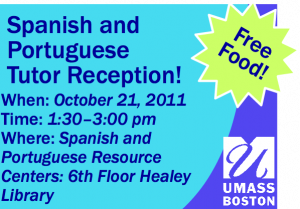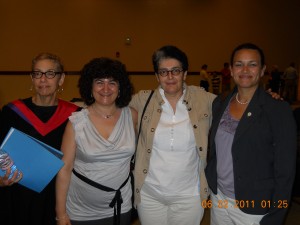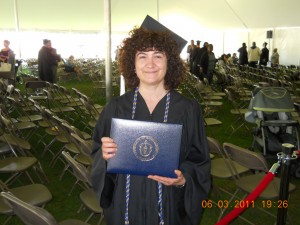Author Archives: Susan Mraz
Congratulations!
New England Translators Association Annual Translation Bash
New England Translators Association
It is a pleasure to acknowledge Diego Mansilla’s involvement in the 6th annual translation bash sponsored by the New England Translators Association on Saturday, September 17, 2011. The bash is an opportunity for interested individuals to translate a 300-word passage of general interest in advance, and then discuss the challenges presented by that passage, weighing the options for each sentence with colleagues who work in the same language pair. It is a stimulating exercise that unfolds without pressure and finds people happily engaging in animated and constructive conversation.
Diego Mansilla facilitated the Spanish group this year, both competently and with charm.
We are grateful for the role he played.
Marian Comenetz
NETA Board
September 19, 2011
Welcome to the Hispanic Studies News Archive 2006–2009
Archived posts from 2006 through 2009 formerly found in the old Hispanic Studies newsletter can now be downloaded in .pdf format (open with Adobe Acrobat Reader) by clicking the links under “Archived Blog Posts 2006-2009” on the sidebar, or through the Archived Blog Posts page (click here to view).
Congratulations to all our 2011 graduates!
We wish you all the best – and look forward to hearing from you!
HISPANIC STUDIES AND LATIN AMERICAN STUDIES STUDENT PRIZES 2011
Hispanic Studies Department Distinction 2011
Maria C. Conte had the highest GPA of this year’s graduating Spanish Majors. She enrolled in Spanish 101 in 2006 to learn Spanish so that she could engage in conversation with the native speakers whom she met on a daily basis. She did not know then that she was going to be “magically absorbed into the Hispanic Studies curriculum,” to use her own words. Maria excelled in all the language classes that she took. That gave her confidence to declare a Spanish major. She showed a talent for learning the intricate grammatical patterns that explain how native speakers produce and understand Spanish. She also enjoyed learning about the history and culture of the Spanish speaking countries. Maria has used her aptitude for learning Spanish to contribute to the UMB community. She worked as a Spanish tutor on campus, thereby helping others to achieve the high academic standards that she values so much. She reports that she has found a “nurturing academic environment” in the Hispanic Studies Department. We are honored to teach students like Maria, whose search for academic excellence is bound to lead to a stellar career in graduate school and beyond.
THE MARIA-LUISA OSORIO PRIZE IN HISPANIC STUDIES
The María-Luisa Osorio Prize is named in recognition of the many contributions of María-Luisa Osorio, a colleague now retired, who taught in the Hispanic Studies Department from 1967 to 1995. One of Professor Osorio’s most passionate academic interests was the role of women in Spanish society; more specifically, the images of women in Spanish literature.
Grateful for her wise and dedicated leadership, her colleagues, upon her retirement, established this prize in her honor, to be awarded to a graduating Spanish major who has written an outstanding paper on the topic of women in Spanish-language literatures or who has demonstrated academic excellence and an active interest in promoting a greater understanding of the role of women in the Spanish-speaking world.
Diana Paola Cortés exemplifies the spirit of the María-Luisa Osorio Prize in Hispanic Studies, awarded to the graduating major who combines academic excellence with a commitment to understanding women’s roles in the Spanish-speaking world. Diana came from Colombia to UMass Boston to pursue a Nursing degree. Out of interest, she also took an advanced class in Spanish, and soon became a double major of Spanish and Nursing. Despite this challenging combination, Diana excelled in both majors, while, in addition, serving as a Spanish tutor and as a mentor in a First Year Seminar on the Latin American experience of exile. Students and faculty alike have appreciated Diana’s presence in the classroom. She is outspoken, thoughtful and hardworking, and she always brings the discussion to the next level. Of her work in the Spanish major, Diana appreciates the opportunity to read “wonderful writers,” whose work has inspired her own writing. Diana plans to pursue a Masters in Forensic Nursing with a focus on Domestic Violence against Women. She believes that with a “better understanding of the Latin-American culture and the diversity within the Spanish language,” she will be able to help women of the Latino community.
THE CLARA ESTOW PRIZE IN HISPANIC STUDIES
A renowned scholar in Castilian Medieval history, Professor Clara Estow dedicated four decades of her life to UMass Boston and the Department of Hispanic Studies (1968-2008). During that time, Professor Estow gathered accolades for her inspiring teaching, her generous mentoring of junior faculty, her scholarly rigor, and her dedication to improving public education in Massachusetts. Her teaching effectiveness and her capacity for mentoring were proverbial. She inspired many students to become teachers and scholars. She showed an extraordinary teaching range and flexibility. Her accomplishments in scholarship were equally outstanding. Professor Estow authored several widely respected books in her field as well as dozens of articles and essays on a number of topics. Professor Estow was repeatedly selected by her peers to represent them on the campus’s most significant committees and governance structures. She was UMass Boston’s first Hispanic to lead the University Faculty Council.
In gratitude for Professor Estow’s tireless, generous, and inspiring academic work on behalf of UMass Boston, her colleagues, upon her retirement, established a prize in her honor. The Clara Estow Prize is awarded to a junior or a graduating senior who has shown excellence, determination, and inspiration in their academic work in Hispanic Studies.
We honor Olga Noemí Argueta with the Clara Estow Prize for 2011. Olga, a life-long resident of Chelsea, comes from a small and close family: her mother, her sister and herself. She attended Chelsea public schools, excelled in academics, and entered UMB in Fall 2005 as a freshman. She was determined to study sciences and pursue a career in health services. She graduates with a double major in Spanish and Psychology. She is recognized by all faculty in the Hispanic Studies Department as a gifted student and a superb human being. We can prove it. Soon after Olga arrived at UMB life dealt her a terrible blow. Both her sister and mother were diagnosed with cancer. Her young sister died after years of battling the illness. Yet, Olga’s family insisted that she continue her studies, and, inspired by them, she did. Olga never complained. She sought and received support from UMB faculty and staff and persevered with fierce determination. Today, Olga Argueta celebrates. Tomorrow she will return to work. She has already begun applying to Nursing School. If you ever are sick and need of a nurse, look her up: you will be in the best possible hands.
SUSAN C. SCHNEIDER MEMORIAL PRIZE IN LATIN AMERICAN STUDIES
Susan C. Schneider was a tenured member of the History Department with a specialty in Latin America and Portugal. She came to the University in 1969 after receiving her doctorate from the University of Texas. She helped establish the Latin American Studies Program at UMass Boston, and in 1976 became its second director, a position she held for almost a decade. Under her stewardship the Program flourished, attracting to the University internationally renowned speakers from all over Latin America. Professor Schneider’s commitment to social justice went well beyond academia to active engagement in providing technical assistance to various centers of learning. Professor Schneider was an ardent advocate for students in and out of the classroom. By her vision and commitment, she inspired many other students to pursue graduate studies, facilitating their acceptance to prestigious institutions. Professor Schneider’s untimely death in 1987 was a loss to the whole community. This award honors her memory by recognizing a student in Latin American Studies who combines academic excellence with social conscience.
We honor Angela J. Melchin’s academic achievement and commitment to human rights with the Susan C. Schneider prize in Latin American Studies. When Angie first enrolled in a Latin American Studies course, she was already a dual Anthropology and Art major. She signed up for Brazilian Civilization to learn about the native country of her favorite rock band, Os Mutantes, and had no idea that the class would change the course of her education and her life as a scholar and artist. Shortly afterwards, she joined the program and has remained committed to studying the region for it’s multiple histories, dynamic political systems and inspiring indigenous movements. That Latin American Studies offers a multidisciplinary approach was suited to Angie’s interests in anthropology and art. Recently, these commitments converged in a meaningful way when she was invited to participate in a group exhibition in London called “400 Women,” featuring original works that responded to the femicides in Ciudad Juarez, Mexico. In the future, Angie hopes to have many more opportunities to integrate her multiple interests and she attests that, no matter her future academic pursuits, Latin American Studies will continue to influence her life in meaningful ways.
Run, Women, Run! Encouraging Women to Run for Office
An event co-sponsored by Hispanic Studies. Click here for more info
Internationally Acclaimed Translator Richard Zenith Speaks at UMass Boston
(Contributed by Valéria M. Souza)
 On Wednesday evening, November 17, 2010, more than 40 guests, including faculty, staff, and students from the University of Massachusetts Boston as well as several neighboring institutions, gathered in Healey Library to attend a talk by internationally acclaimed translator Richard Zenith, entitled “Translating Fernando Pessoa and His Personas.” The lecture, collaboratively organized by Professors Diego Mansilla (Translation) and Valéria M. Souza (Portuguese), was sponsored by the Department of Hispanic Studies Translation Program.
On Wednesday evening, November 17, 2010, more than 40 guests, including faculty, staff, and students from the University of Massachusetts Boston as well as several neighboring institutions, gathered in Healey Library to attend a talk by internationally acclaimed translator Richard Zenith, entitled “Translating Fernando Pessoa and His Personas.” The lecture, collaboratively organized by Professors Diego Mansilla (Translation) and Valéria M. Souza (Portuguese), was sponsored by the Department of Hispanic Studies Translation Program.
Richard Zenith, who translated numerous texts by Lusophone poets and authors including Fernando Pessoa, João Cabral de Melo, José Luís Peixoto, and António Lobo Antunes, is also the author of short stories and poetry in Portuguese. He recently published a photo biography on Pessoa (Temas & Debates, 2010) and is currently working on a biography of the poet. Mr. Zenith’s book Fernando Pessoa & Co: Selected Company (Grove Press) won the 1999 PEN Award for Poetry in Translation, and his new version of Pessoa’s Book of Disquiet (Penguin) was awarded the 2002 Gulbenkian Prize for Portuguese Translation. Mr. Zenith visited the University of Massachusetts Boston this month as part of an international speaking tour.
During last week’s talk, attendees first had the opportunity to gain relevant background information about Fernando Pessoa and his heteronyms, presented by the translator in a lively and engaging format, before participating in a workshop-style question and answer session, in which Mr. Zenith responded to translation students’ many enthusiastic inquiries regarding the challenges involved in working with some specific poems, namely Pessoa’s famous “Autopsychography” and “Tobacco Shop.”
Because the talk drew a substantial audience comprised of individuals with a diverse array of interests—ranging from Portuguese and Spanish language students, professional translators, and translation students to scholars and students of literature—it not only stimulated thought-provoking discussion, but also served as a valuable means of strengthening interdisciplinary and interdepartmental connections among different programs in the humanities at UMass Boston.
“Translating Fernando Pessoa and His Personas” By Richard Zenith Wednesday, November 17, 2010 at 5:30 PM
The Department of Hispanic Studies Translation Program at the University of Massachusetts Boston presents: “Translating Fernando Pessoa and His Personas”, by Richard Zenith.
Wednesday, November 17, 2010 at 5:30 PM
Healey Library, 11th floor, Room 0011A
This event is free and open to the public! [Conference and discussion to be held in English]
Richard Zenith is an internationally-known editor and translator of Portuguese prose and poetry. His Fernando Pessoa & Co: Selected Company (Grove Press) won the 1999 PEN Award for Poetry in Translation, and his new version of Pessoa’s Book of Disquiet (Penguin) was awarded the 2002 Gulbenkian Prize for Portuguese Translation. Zenith’s translations also include Education in Stone: Selected Poems (Archipelago Books), by Brazilian poet João Cabral de Melo, and four novels by António Lobo Antunes (Grove/Atlantic). He is also the author of short stories and poetry in Portuguese.
Mr. Zenith will also give a talk entitled “Fernando Pessoa and the Portuguese New State circa 1930” at UMass Dartmouth
Download flier
Congratulations to Angie Melchin, Latin American Studies concentrator
Congratulations to Angie Melchin, Latin American Studies concentrator who graduated in 2010. Angie is an invited participant in an exhibition commemorating the women killed in Ciudad Juárez, Mexico.
The exhibition, entitled “400 Women,” will be held in the Shoreditch Town Hall, in London, England, from 12-28 November 2010. This project was conceived by artist Tamsyn Challenger in response to the brutal murder and rape of more than 400 women over a decade in the border town of Ciudad Juárez and the state of Chihuahua, Mexico. Some 200 exceptional artists were invited to paint an image, based on the Mexican tradition of retablos, of one of the murdered women. Tamsyn Challenger has written that the project originated in 2005, when she was commissioned by BBC radio 4’s Woman’s Hour. Challenger went to Mexico and met with families of the victims. She believes that each of the images created for the exhibition “will stand as a statement against gender violence” as well as against the impunity with which the perpetrators of the murders – and of violence against women in general — continue to operate.
The exhibition raises important questions about collective commemoration of the dead and disappeared. Challenger has obtained over 100 images of the murdered women through Amnesty International, the group Nuestra Hijas de regreso a casa, and the Casa Amiga Rape Crisis centre in Ciudad Juárez. When no image is extant, the artists have incorporated the woman’s name into the piece, as Angie has done in her etching.





